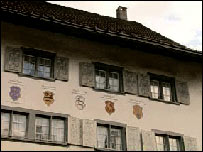It is not very nice to be accused of being a witch, at least in the 18th century it was a risky business, especially in Switzerland. Oh yes, this is a true story, and I must admit not in my words, but those of a BBC report I found on the Internet. The story of Anna Göldi is not unknown in Switzerland and she was the last witch to be executed. Whether she really looked like this I don't know, but the photo seems to be the only one I found. I pepped it up a bit to make it look a bit more witchy.

"Fear and superstition fuelled witch-hunts all over Europe in the Middle Ages and caused the deaths of many innocent women. The last execution for witchcraft took place little more than 200 years ago but campaigners in Switzerland claim it may be time to clear Anna Goeldi's name.
To understand Anna Goeldi's story you need to go to where it unfolded, in the tiny Swiss canton of Glarus. It is a long narrow valley, the mountains loom above, the villages are squeezed below into the spaces where the grey rock unwillingly makes way for earth and grass.
You get the sense, even today, that many of the world's events have passed Glarus by. This was where Anna Goeldi arrived in 1765, looking for work as a maid. One of the houses she worked in still exists. It is imposing, smug almost, four storeys high, with a grand doorway, and the crests of the noble Glarus families who lived there painted on its walls.
She found work with Jakob Tschudi, the magistrate and a rising political figure. We know from records of the time that Anna Goeldi was tall, generously proportioned, with dark hair, brown eyes, and a rosy complexion. These attributes were not lost on her employer. All went well to begin with, until one morning one of the Tschudi children found a needle in her milk. Two days later needles appeared in the bread as well and suspicion fell upon Anna. It is the first clue to Anna Goeldi's fate.
 On the left the house where Anna Goeldi was a maid. Despite her protestations of innocence, she was sacked by the Tschudis, accused of witchcraft, tortured, and finally executed. Not in the Middle Ages, but in 1782, at the height of Europe's so-called Age of Enlightenment.
On the left the house where Anna Goeldi was a maid. Despite her protestations of innocence, she was sacked by the Tschudis, accused of witchcraft, tortured, and finally executed. Not in the Middle Ages, but in 1782, at the height of Europe's so-called Age of Enlightenment.But today Walter Hauser, a local journalist, does not believe Anna died because isolated Glarus remained mired in medieval superstition. Researching the original records of the case, he found something far more banal. "Jakob Tschudi had an affair with Anna Goeldi," he explains. "When she was sacked, she threatened to reveal that. Adultery was a crime then. He stood to lose everything if he was found out." But at that time in Glarus, witchcraft was a crime.
Mr Hauser calls Anna's trial and execution "judicial murder". "Educated people here did not believe in witchcraft in 1782," he insists. "Anna Goeldi was a threat to powerful people. They wanted her out of the way, accusing her of being a witch. It was a legal way to kill her." Anna Goeldi's ordeal remains, in meticulous detail, in the Glarus archives.
This woman, who could neither read nor write, was questioned day and night by the religious and political leaders of Glarus. She insisted on her innocence, so they tortured her, hanging her up by her thumbs and tying stones to her feet.
When she finally confessed, it was to all sorts of bizarre cliches. The devil had appeared to her in the form of a black dog. The needles had been given to her by Satan. But once free of the torture, she withdrew her confession. They tortured her again so brutally that she confessed again, and stuck with her confession. Two weeks later, she was led out to the public square, where her head was cut off with a sword.
Fritz Schiesser, who today represents Glarus in the Swiss parliament, believes it is time to officially acknowledge this as a miscarriage of justice. "Everyone agrees that what happened was completely wrong," he tells me. "We need to take this last step, and admit it.
But in Glarus opinions are mixed. At the local high school, many students are uncomfortable about reviving this old story. "I agree it was shocking, but that was Glarus then," says one girl. "It happened a long time ago," says another. "I don't think people today should be held responsible for the past."
They could exonerate Anna Goeldi today, but refuse to do so, calling it a cheap solution which would not help anyone. Journalist Walter Hauser is disappointed. "We were the last in Europe to execute a woman for witchcraft," he says "It is a stain on our history. Now we could do something to erase that stain." Fritz Schiesser has tabled a motion in parliament calling for Anna Goeldi's exoneration. This weekend a museum will open in Glarus dedicated to her.
It is ironic really. When Anna Goeldi was executed, the people of Glarus tried to hush it up, afraid of what the rest of the world would think. Two hundred and twenty five years later, her story has come back to haunt them."
**********
This report was written in 2007. Since then Anna Göldi (or Goeldi) has been rehabilitated. Perhaps 225 years too late.
No comments:
Post a Comment